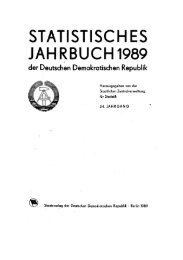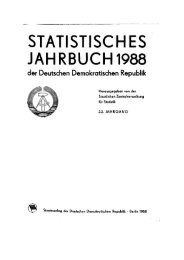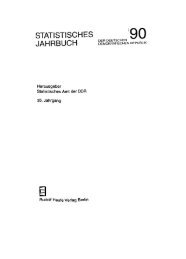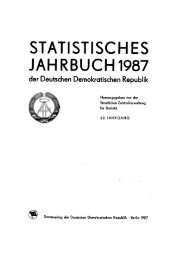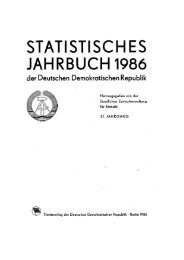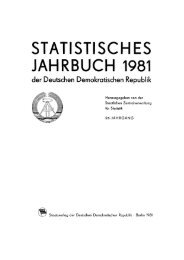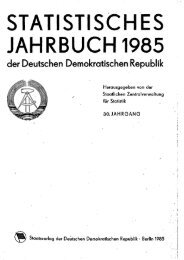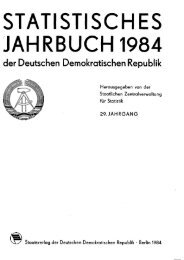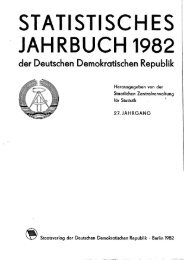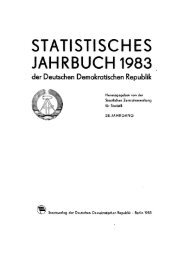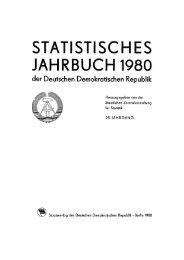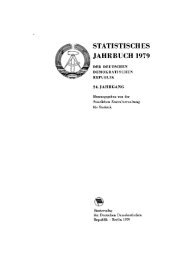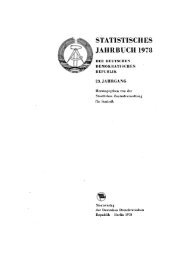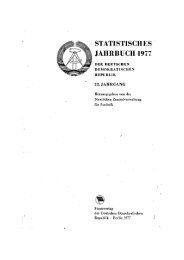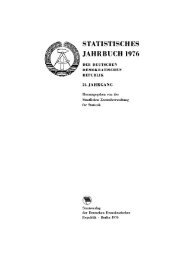- Page 2 and 3:
THE STATISTICAL YEARBOOK OF C-AJSTA
- Page 5 and 6:
TABLE OF CONTENTS. STATISTICAL SUMM
- Page 7 and 8: RECORD. The earliest official recor
- Page 9 and 10: SHORT HISTORY. THE DOMINION OF CANA
- Page 11 and 12: SHORT HISTORY. 5 1749. June 21. * T
- Page 13 and 14: SHORT HISTORY. 7 1813. May 5. Ameri
- Page 15 and 16: SHORT HISTORY. 9 1860. Art Associat
- Page 17 and 18: SHORT HISTORY. 11 1889. September 1
- Page 19 and 20: PHYSICAL FEATURES 13 Hudson Bav is
- Page 21 and 22: CONSTITl TION AND GOVERNMEXT. 15 Ot
- Page 23 and 24: CONSTITUTION AND GOVERNMENT. 17 QUA
- Page 25 and 26: CONSTITUTION AND GOVERNMENT. 19 the
- Page 27 and 28: CONSTITUTION AND GOVERNMENT. 21 GOV
- Page 29 and 30: CONSTITUTION AND GOVERNMENT. 23 GOV
- Page 31 and 32: CONSTITUTION AND GOVERNMENT. 25 DOM
- Page 33 and 34: CONSTITUTION AND GOVERNMENT. 27 LIS
- Page 35 and 36: CONSTITUTION AND GOVERNMENT. 29 LIS
- Page 37 and 38: CONSTITUTION AND GOVERNMENT. 31 LIS
- Page 39 and 40: CONSTITUTION AND OOVEENMENT. 33 The
- Page 41 and 42: CONSTITUTION AND GOVERNMENT. 35 PRO
- Page 43 and 44: CONSTITUTION AND GOVERNMENT. 37 PRO
- Page 45 and 46: CONSTITUTION AND GOVERNMENT, 39 PRO
- Page 47 and 48: CONSTITUTION AND GOVERNMENT. 41 PRO
- Page 49 and 50: SOVEREIGNS, AREA AND POPULATION. 43
- Page 51 and 52: SOVEREIONS, AREA AND POPULATION. 45
- Page 53 and 54: SOVEREIGNS, AREA AND POPULATION. 47
- Page 55 and 56: TREATIES. 49 Prince Edward Island i
- Page 57: TEEA TIES. 51 Article III. provides
- Page 61 and 62: LANDS AND LAND REGULATIONS. 55 Ther
- Page 63 and 64: LANDS AXD LAND REGULATIONS. LETTERS
- Page 65 and 66: LANDS AND LAND REGULATIONS. 59 quen
- Page 67 and 68: LANDS AND LAND REGULATIONS. 61 8. T
- Page 69 and 70: LANDS AND LAND REGULATIONS. 63 Abou
- Page 71 and 72: LANDS AND LAXD REGULATIONS. 65 If p
- Page 73 and 74: EVENTS OF THE YEAR. 67 Colonial Pre
- Page 75 and 76: AGRICULTURE. 69 STATISTICS OF AGRIC
- Page 77 and 78: 70 STATISTICAL YEAR-BOOK. RETURN OF
- Page 79 and 80: 72 STATISTICAL YEARBOOK. AREA AND Y
- Page 81 and 82: 74 STATISTICAL YEAR-BOOK. -Quantiti
- Page 83 and 84: 76 STATISTICAL YEAR-BOOK. Value of
- Page 85 and 86: 78 STATISTICAL YEAR-BOOK. Quantitie
- Page 87 and 88: 80 STATISTICAL YEAR-BOOK. FARM STOC
- Page 89 and 90: 82 S TA TIS TIC A L YEA R-BOOK. LIV
- Page 91: £ C ^ O W H O H M •^r-^QO^iO^O^
- Page 94 and 95: 86 STATISTICAL YEAR-BOOK The follow
- Page 96 and 97: 88 STATISTICAL YEAR-BOOK. The follo
- Page 98 and 99: 90 STATISTICAL YEAR-BOOK. Quantitie
- Page 100 and 101: 92 STATISTICAL YEAR-BOOK. Quantitie
- Page 102 and 103: 94 STATISTICAL YEAR-BOOK. QUANTITIE
- Page 104 and 105: 96 STATISTICAL YEAR-BOOK. QUANTITIE
- Page 106 and 107: STATISTICAL YEAR-BOOK. QUANTITIES A
- Page 108 and 109:
100 STATISTICAL YEAR-BOOK. QUANTITI
- Page 110 and 111:
102 STATISTICAL YEAS-BOOK. QUANTITI
- Page 112 and 113:
104 STATISTICAL YEAR-BOOK. QUANTITI
- Page 114 and 115:
106 STATISTICAL YEAR-BOOK. QUANTITI
- Page 116 and 117:
108 STATISTICAL YEAR-BOOK. EXPORTS
- Page 118 and 119:
MINERALS. Ill STATISTICS OF MINERAL
- Page 120 and 121:
MINERALS. 113 MINERALS—NON-METALL
- Page 122 and 123:
MINERALS. 115 The values of the pri
- Page 124 and 125:
MINERALS. 117 The character of the
- Page 126 and 127:
MIXERALS. 119 In British Columbia,
- Page 128 and 129:
MINEBALS. 121 Quantity and value of
- Page 130 and 131:
o « £ 2 3 3 S * 2 z o r^i>rx'o"t^
- Page 132 and 133:
MINERALS. 125 «I 3 S a P5 r_^ CM C
- Page 134 and 135:
MINERALS. 127 In the session of 189
- Page 136 and 137:
MINERALS. 129 Following are the amo
- Page 139 and 140:
MINERALS. 131 The value of the expo
- Page 141 and 142:
MINERALS. 133 Taking the above divi
- Page 143 and 144:
MINERALS 135 IRON AND STEEL IMPORTS
- Page 145 and 146:
MINERALS. 137 GOLD. The value of th
- Page 147 and 148:
MINERALS. 139 On Lake Superior the
- Page 149 and 150:
MINERALS. 141 CANADIAN PETROLEUM AN
- Page 151 and 152:
MINERALS. PRODUCTION OF SALT IN CAN
- Page 153:
QUANTITY AND VALUE OF SILVER PRODUC
- Page 156 and 157:
MINERALS. 147 produced in Ontario,
- Page 158 and 159:
MINERALS. 149 GYPSUM. Gypsum is at
- Page 160 and 161:
MINERALS. 151 QUEBEC. The mining la
- Page 162 and 163:
MINERALS. 153 cents per acre per an
- Page 164 and 165:
MINERALS. 155 amount from them and
- Page 166 and 167:
MINERALS. 157 An annual tax of 25 c
- Page 168 and 169:
MINERALS. 159 of metals, mercury, l
- Page 170 and 171:
FISHERIES. 161 The following are su
- Page 172 and 173:
FISHERIES. 163 seal skins, amountin
- Page 174 and 175:
FISHERIES. 165 NUMBER OF VESSELS, T
- Page 176 and 177:
FISHERIES. i! li -I o ° a Q INS rt
- Page 178 and 179:
FISHERIES. 169 The following are st
- Page 180 and 181:
TRADE AND COMMERCE. 171 llgll.|l|ll
- Page 182 and 183:
TRADE AND COMMERCE. W * fc-cotocscq
- Page 184 and 185:
TRA DE AND COMMERCE. 175 O ooco ONO
- Page 186 and 187:
TRADE AND COMMERCE. 177 O rs £S 1
- Page 189 and 190:
•uoi}dumsuo£) araojj 10} paja^ -
- Page 191 and 192:
TRADE AND COMMERCE. 181 a K 5 H o u
- Page 194:
CLASS B.— ARTICLES IN A CRUDE CON
- Page 197 and 198:
111 1111 §si TRADE AND COMMERCE. 1
- Page 199:
3,438 128,496 2,453 4,532 5,055 1,7
- Page 203:
271,344 287,814 192,685 151,668 195
- Page 207:
Gloves and mitts, all kinds. Goods
- Page 210 and 211:
TRADE AND COMMERCE. 193 lllsllllgll
- Page 212:
f 1880-82 33,038,421 5,141,595 38,1
- Page 215 and 216:
TRADE AND COMMERCE. 197 Average rat
- Page 217 and 218:
TRADE AND COMMERCE. 199 SUMMARY OF
- Page 219 and 220:
TRADE AND COMMERCE. 201 SUMMARY OF
- Page 221 and 222:
TRADE AJSD COMMERCE. 203 SUMMARY OF
- Page 223 and 224:
TRADE AND COMMERCE. 205 SUMMARY OF
- Page 225 and 226:
TRADE AND COMMERCE. 207 SUMMARY OF
- Page 227 and 228:
TRADE AND COMMERCE. 209 SUMMARY OF
- Page 229 and 230:
TRADE AND COMMERCE. 211 IMPORTS OF
- Page 231 and 232:
TRADE AND COMMERCE. 213 The followi
- Page 233 and 234:
TRADE AND COMMERCE. 215 1 =8 5 PS 1
- Page 235 and 236:
TRADE AND COMMERCE. 217 RELATIVE VA
- Page 237 and 238:
TRADE AXD COMMERGE. 219 RELATIVE VA
- Page 239 and 240:
TRADE AND COMMERCE. llllllllllil gl
- Page 241 and 242:
TRADE AND COMMERCE. 223 exported fr
- Page 243 and 244:
exported from Canada, &c.—Continu
- Page 245 and 246:
TRADE AND COMMERCE. 227 exported fr
- Page 247 and 248:
exported from Canada, &c.—Continu
- Page 249:
1897. QCOOOONtOiCOOOOii-lcOiO^CSi-t
- Page 252 and 253:
TRADE AND COMMERCE. 233 Exported fr
- Page 254 and 255:
TRADE AND COMMERCE. 235 Exported fr
- Page 256 and 257:
Exported from Canada, ifec.—Concl
- Page 258 and 259:
TRADE AND COMMERCE. 239 The followi
- Page 260 and 261:
TRADE AND COMMERCE. 241 VALUE OF AR
- Page 262 and 263:
TRADE AND COMMERCE. 243 EXPORTS BY
- Page 264 and 265:
TRADE AND COMMERCE. 245 EXPORTS OF
- Page 266 and 267:
TRADE AND COMMERCE. 247 ber 1,000 h
- Page 268 and 269:
TRADE AXD COMMERCE. 249 The followi
- Page 270 and 271:
TRADE AND COMMERCE. 251 The figures
- Page 272 and 273:
TRADE AND COMMERCE. 253 The followi
- Page 275 and 276:
CD P • Ffffl w CO >%M I" m-n i II
- Page 278 and 279:
TRADE AND COMMERCE. 257 The index n
- Page 280 and 281:
TRADE AND COMMERCE. 259 IMPORTS AND
- Page 282:
STATEMENT of the Value of Merchandi
- Page 285:
-g 31 Of #- . ©©©©©©©0©©0
- Page 288 and 289:
TRADE AND COMMERCE. 265 went into e
- Page 290 and 291:
TRADE AND COMMERCE. 267 oils, $336,
- Page 292 and 293:
TRADE ASD COMMERCE. 269 IMPORTS FRO
- Page 294 and 295:
TRADE AND COMMERCE. 271 struments,
- Page 296 and 297:
TRADE AND COMMERCE. 273 IMPORTS FRO
- Page 298 and 299:
CURRENCY AND BANKING. 275 Average m
- Page 300 and 301:
CURRENCY AND BANKING. 277 The follo
- Page 302 and 303:
CURRWCr AND BANKING. 279 DEPOSITS I
- Page 304 and 305:
CURRENUT AND BASKING. 231 Amount of
- Page 306 and 307:
CURRENCY AND BANKING. 283 Compariso
- Page 309 and 310:
CURRENCY AND BANKING. 285 The follo
- Page 311 and 312:
CURRENCY AND BANKING. 287 The rate
- Page 313 and 314:
CURRENCY AND BANKING. 289 GOVERNMEN
- Page 315 and 316:
CURRENCY AND BANKING. 291 TRANSACTI
- Page 317 and 318:
CURRENCY AND BANKING. o KOMThXO^C.f
- Page 319:
SUMMARY STATEMENT OF THE AFFAIRS OF
- Page 323 and 324:
CURRENCY AND BANKING. 297 The follo
- Page 325 and 326:
RAILWAYS AND CANALS. 299 As a rule,
- Page 327:
The following is a comparative stat
- Page 331 and 332:
RAILWAYS AND CANALS. 303 SUMMARY ST
- Page 333:
STATEMENT OF THE GROSS AND NET INCO
- Page 336 and 337:
RAIL WA YS A ND CA NA LS. 307 PROPO
- Page 338 and 339:
RAIL WA TS AND CANALS. 309 Out of t
- Page 340 and 341:
RAILWAYS AND CANALS. 311 The follow
- Page 342 and 343:
BAIL WA YS AND CANALS- PASSENGERS K
- Page 344 and 345:
RAILWAYS AND CASALS. 315 The change
- Page 346 and 347:
RAILWAYS AND CANALS. 317 Since the
- Page 348 and 349:
RAILWAYS AND CANALS. 319 The follow
- Page 350:
mi GO 00 00 CO COS© mm - W M O H H
- Page 353 and 354:
RAILWAYS AND CAXALS. 323 EXPENDITUR
- Page 355 and 356:
RAILWAYS AND CANALS, 325 PASSENGER
- Page 357 and 358:
RAILWAYS AND CANALS. 327 The passen
- Page 359 and 360:
RAILWAYS AND CANALS. 329 The follow
- Page 362 and 363:
RAILWAYS AND CANALS. 331 The follow
- Page 364 and 365:
SAIL WAYS AND CANALS. 333 RAILWAYS
- Page 366 and 367:
BAIL WAYS AND CANALS. 335 THE GREAT
- Page 368 and 369:
•O^ II o P t S,T8Sll9SS'B.-* OS b
- Page 370 and 371:
RAILWAYS AND CANALS. 339 gegi IjT |
- Page 372 and 373:
RAILWAYS AND CANALS. 341 GRAIN PASS
- Page 374 and 375:
RAILWAYS AND CANALS. -343 CANADIAN
- Page 377:
CJtct- J 30 J° 000000000000000000
- Page 380 and 381:
RAILWAYS AND CANALS. 347 The follow
- Page 382 and 383:
MARINE. 349 STATEMENT OF LIGHT-HOUS
- Page 384 and 385:
MARINE. 351 REVENUE OF THE DEPARTME
- Page 386 and 387:
•MARINE. 353 The following is a c
- Page 388 and 389:
MARINE. 355 TOTAL TONNAGE OF SEA-GO
- Page 390:
'8 • 0 SP out cent • t» : T3 V
- Page 393 and 394:
MARINE. 359 PRINCE EDWARD ISLAND. R
- Page 395 and 396:
MARINE. 361 The following table sho
- Page 398 and 399:
MARINE. 363 BRITISH, CANADIAN AND F
- Page 400 and 401:
MARINE. 365 VESSELS ARRIVED AT AND
- Page 402 and 403:
MARINE. 367 The coasting trade of C
- Page 405 and 406:
MARINE. 369 The following table giv
- Page 407 and 408:
MARINE. 371 the United Kingdom, Can
- Page 409 and 410:
POST OFFICE. 373 The three Governme
- Page 411:
% o 3 hd I ssgiiisii sisiiisii sias
- Page 414 and 415:
POST OFFICE. 377 The number of stam
- Page 416 and 417:
POST OFFICE. '* 379 III Jf CseOTt.r
- Page 418 and 419:
POST OFFICE. 381 TOTAL MONEY ORDERS
- Page 420 and 421:
FINANCE. 383 FINANCE STATISTICS. RE
- Page 422 and 423:
FINANCE. 385 CUSTOMS DUTIES—Conti
- Page 424 and 425:
FINANCE. 387 MISCELLANEO (JS REVENU
- Page 426 and 427:
FINANCE. I! UU u Wei •2-S § m S^
- Page 428 and 429:
FINANCE. 391 If •* CO 1G) r-t N C
- Page 430 and 431:
FINANCE. 393 9 « .S .2 «"-= u-S S
- Page 432 and 433:
FINANCE. JilgfS SP=i:£fa=!'*3>-S»
- Page 434 and 435:
FINANCE. 397 II NNC JCOH: NO' SOWC
- Page 436 and 437:
FINANCE. 399 •a . s p a) ^ ^^ffil
- Page 438 and 439:
FINANCE. 401 Revenue and expenditur
- Page 440 and 441:
FINANCE. 403 The development of oth
- Page 442 and 443:
FINANCE. 405 The following table sh
- Page 444 and 445:
m m t-( CO Ms >§8! 1311 SSS! FINAN
- Page 446 and 447:
lillllillliilliiiifi^iSiiSliil Bmmm
- Page 448 and 449:
FINAXOE. 411 GOVERNMENT EXPENDITURE
- Page 450 and 451:
fail! FINANCE. 41a Tfllf . ut » !
- Page 452 and 453:
FINANCE. 415 The following shows th
- Page 454 and 455:
FINANCE. PUBLIC DEBTS IN FOREIGN CO
- Page 456 and 457:
FINANCE. 419 PROVINCE OF NEW BRUNSW
- Page 458:
QCQOCDGDGOGCGOGCQOGOGCQOOOQoaGOeGOQ
- Page 461 and 462:
INSURANCE. 423 INSURANCE STATISTICS
- Page 463 and 464:
INSURANCE. 425 FIRE INSURANCE DONE
- Page 465 and 466:
INSURANCE. 427 astrous fire in St.
- Page 467 and 468:
INSURANCE. 429 DISTRIBUTION OF RECE
- Page 469 and 470:
INSURANCE. 431 INLAND AND OCEAN MAR
- Page 471 and 472:
WSUBAXCE. 433 LIFE INSURANCE. AMOUN
- Page 473 and 474:
INSURANCE. 435 INSURANCE DEATH RATE
- Page 475 and 476:
INSURANCE. 437 CANADIAN LIFE COMPAN
- Page 477 and 478:
IXSUSANCE. The following, table giv
- Page 480:
ASSESSMENT SYSTEM. ABSTRACT OF LIFE
- Page 483:
ASSETS AND LIABILITIES OF CANADIAN
- Page 486 and 487:
IXSURAXCE. 445 The above companies
- Page 488:
DIVISION OF PREMIUMS BY CLASSES OF
- Page 491:
TELEGRAPHS. LAND AND CABLE TELEGRAP
- Page 495 and 496:
TELEGRAPHS. 451 GOVERNMENT TELEGRAP
- Page 497 and 498:
TELEGRAPHS. 463 TELEGRAPHS IN THE P
- Page 499 and 500:
MILITIA. 455 FINANCIAL STATEMENT OF
- Page 501 and 502:
CHULCHES. 457 • v. By provinces,
- Page 503 and 504:
EDUCATION. 459 Ilct B a ^2 >T3
- Page 505 and 506:
EDUCATION. 461 The following table
- Page 507 and 508:
EDUCATION. m rtV«V«BoVTV«fflV«f
- Page 509 and 510:
EDUCATION. 465 QUEBEC. Educational
- Page 511 and 512:
EDUCATION. 467 The following partic
- Page 513 and 514:
EDUCA T10X. 469 NOVA SCOTIA EDUCATI
- Page 515 and 516:
EDUCATION. 471 At the Victoria Scho
- Page 517 and 518:
EDUCATION. RECEIPTS AND EXPENDITURE
- Page 519 and 520:
EDUCATION. 475 BRITISH COLUMBIA. Th
- Page 521 and 522:
EDUCATION. 477 PRINCE EDWARD ISLAND
- Page 523 and 524:
EDUCATION. 479 The Public School ex
- Page 525 and 526:
EDUCATION. 481 THE HIGHER EDUCATION
- Page 527 and 528:
ELECTIONS. 483 PARLIAMENTARY ELECTI
- Page 529 and 530:
ELECTIONS. 485 Statement by provinc
- Page 531 and 532:
INSANE. 487 With the exception of N
- Page 533 and 534:
JXSANE. 489 fees, subscriptions and
- Page 535 and 536:
TEMPERANCE. 491 STATEMENT SHOWING T
- Page 537 and 538:
TEMPERANCE. 493 STATEMENT SHOWING T
- Page 539 and 540:
TEMPERANCE. 495 moioiaaiow'* to tc
- Page 541 and 542:
INDIANS. 497 The following table gi
- Page 543 and 544:
INDIANS. 499 The quantity of land s
- Page 545 and 546:
PATENT. 501 PATENT OFFICE. The foll
- Page 547 and 548:
BIRTHS, DEATHS AND MARRIAGES. 503 T
- Page 549 and 550:
BIRTHS, DEATHS AND MARRIAGES. 505 A
- Page 551 and 552:
PEN1 TEN T1A SIES. 507 KINGSTON PEN
- Page 553:
OFFENCES FOR WHICH PERSONS WERE COM
- Page 556 and 557:
CMMIXAL STATISTICS. 511 The followi
- Page 558 and 559:
CRIMINAL STATISTICS. 513 The follow
- Page 560 and 561:
CRIMINAL STATISTICS. 515 TOTAL NUMB
- Page 562:
NUMBER OF CONVICTIONS FOR INDICTABL
- Page 566 and 567:
CRIMINAL STATISTICS. 519 The follow
- Page 569 and 570:
CRIMINAL STA TISTICS. 521 The follo
- Page 571 and 572:
CRIMINAL STATISTICS. 523 AGES OF PE
- Page 573 and 574:
CHIMIN A L ST A TIS TICS. 525 The f
- Page 575 and 576:
CRIMINAL STATISTICS. 527 The follow
- Page 577 and 578:
APPENDIX. The following is a list o
- Page 579 and 580:
APPENDIX. 531 THE HOUSE OF COMMONS
- Page 581 and 582:
APPENDIX. 533 The following are the
- Page 583 and 584:
APPENDIX. 535 PROVINCE OF NOVA SCOT
- Page 585 and 586:
APPEXDIX 537 PROVINCE OF BRITISH CO
- Page 587 and 588:
APPENDIX. 539 PROVINCE OF PRINCE ED
- Page 589 and 590:
INDEX. PAGE. ACCIDENT insurance....
- Page 591 and 592:
INDEX. 543 PAGE. Canada, rivers of
- Page 593 and 594:
INDEX. 545 PAGE Exports, breadstuff
- Page 595 and 596:
INDEX. 547 PAGE. IMPORTS by classes
- Page 597 and 598:
INDEX. 549 PAGE. Manitoba, debts an
- Page 599 and 600:
INDEX. 551 PAGE. Post Office number
- Page 601 and 602:
INDEX. 553 PAGE. Spanish Possession
- Page 603:
H_» ^ ^^B [lIMIIliimWB NATIONAL LI



